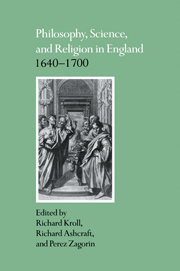Book contents
- Frontmatter
- Contents
- Notes on contributors
- Preface
- 1 Introduction
- Part I The Cambridge Platonists: philosophy at mid century
- Part II The Restoration settlement
- 7 Latitudinarianism and toleration: historical myth versus political history
- 8 The intellectual sources of Robert Boyle's philosophy of nature: Gassendi's voluntarism and Boyle's physico-theological project
- 9 Latitudinarianism and the “ideology” of the early Royal Society: Thomas Sprat's History of the Royal Society (1667) reconsidered
- 10 Locke and the latitude-men: ignorance as a ground of toleration
- 11 John Locke and latitudinarianism
- Index
9 - Latitudinarianism and the “ideology” of the early Royal Society: Thomas Sprat's History of the Royal Society (1667) reconsidered
Published online by Cambridge University Press: 05 November 2011
- Frontmatter
- Contents
- Notes on contributors
- Preface
- 1 Introduction
- Part I The Cambridge Platonists: philosophy at mid century
- Part II The Restoration settlement
- 7 Latitudinarianism and toleration: historical myth versus political history
- 8 The intellectual sources of Robert Boyle's philosophy of nature: Gassendi's voluntarism and Boyle's physico-theological project
- 9 Latitudinarianism and the “ideology” of the early Royal Society: Thomas Sprat's History of the Royal Society (1667) reconsidered
- 10 Locke and the latitude-men: ignorance as a ground of toleration
- 11 John Locke and latitudinarianism
- Index
Summary
In this chapter I intend to take a fresh look at one of the most famous texts of the scientific movement in seventeenth-century England, which, it has been said, “should also be read as a latitudinarian manifesto.” In part I want to consider what light is thrown on Thomas Sprat's History of the Royal Society by some new manuscript evidence concerning its genesis and reception which I have found, including a draft by Henry Oldenburg for the passage in which Sprat attempted to deal with problems about the repeatability of experiments noted by no less a figure than Robert Boyle, and some gleanings from the manuscript remains of another prominent Fellow of the Society, John Evelyn. Of the latter, the most significant are some hints to be derived from Evelyn's correspondence with the Somerset virtuoso, John Beale, now preserved in the Evelyn Collection at Christ Church, Oxford; but the most poignant are perhaps my own notes on Evelyn's markings in his copy of Sprat's History, made when the book was on show at a London auction house in 1978. For the volume was stolen before the sale, and my notes may now constitute the only record of these annotations. I have therefore appended a record of them to this essay, together with a transcript of the paper by Oldenburg.
More important, however, I want to use this and other evidence to reconsider the context of Sprat's book, and especially the relationship of the views that it expresses to the opinions of the members of the Society on whose behalf it was published.
- Type
- Chapter
- Information
- Philosophy, Science, and Religion in England 1640–1700 , pp. 199 - 229Publisher: Cambridge University PressPrint publication year: 1992
- 1
- Cited by



